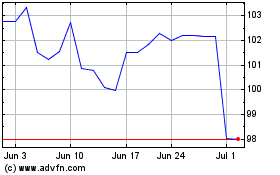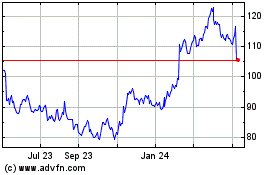By Erich Schwartzel
Walt Disney Co. said the coronavirus pandemic took a $1.4
billion bite out of its earnings, as the company detailed how the
global economic fallout would affect every part of its
entertainment business for the foreseeable future.
Total operating income for the three months ended March 28 fell
37% from a year earlier to $2.4 billion, the company said Tuesday,
while revenue rose 21% to $18 billion.
The business impact of the pandemic will likely be even more
pronounced in the current quarter. Shutdowns that first began in
Asia became more widespread globally only in the final few weeks of
Disney's fiscal second quarter.
Disney's net income for the quarter fell 91% to $475 million,
due to both the impact of the virus and accounting for the
consolidation of assets acquired in its 2019 acquisition of assets
of 21st Century Fox.
Analysts have downgraded Disney stock, envisioning a future
defined by the highly contagious virus, even as stay-at-home orders
are lifted and businesses reopen.
Disney Executive Chairman Robert Iger sounded an upbeat note for
investors, saying the company's movies and parks will be sought out
once again when lockdowns end. "People find comfort in our messages
of hope and optimism," he said.
But the coronavirus pandemic and the economic shutdown it
triggered have exposed a vulnerability to Disney's once-bulletproof
business plan.
Unlike conglomerates that encompass various holdings without
much functional interconnection, Disney is a finely tuned franchise
machine, capable of absorbing a set of characters like the Marvel
Studios superheroes or the Star Wars universe and using them to
sell movie tickets, action figures, streaming-service subscriptions
and theme-park tickets.
But the pandemic has caused practically every part of that
machine to grind to a halt. The close coordination that made for
lucrative use of characters and story lines across different parts
of the company has now led to a domino-like cascade of problems
throughout its divisions.
Disney said the $1.4 billion pandemic-related impact in the
latest quarter reflected not only movie-release delays and
theme-park closures, but also lower ad revenue at its TV networks
and shuttered productions on Broadway.
The company has raced to cut costs, shaving executive salaries
and furloughing more than 100,000 workers. On Tuesday, Disney
finance chief Christine McCarthy said the company board had decided
not to pay a semiannual dividend scheduled for July, a move
expected to preserve about $1.6 billion in cash.
In the quarter reported Tuesday, the pandemic's primary impact
was on the theme-parks division, with international operations like
Shanghai Disney Resort closing well before the mid-March closures
of Disneyland and Walt Disney World in the U.S.
The division that includes Disney parks saw its operating income
fall 58% to $639 million and revenue drop 10% to $5.5 billion.
Disney estimates the pandemic eliminated about $1 billion in
operating income for the division in the fiscal second
quarter..
Disney Chief Executive Bob Chapek said Shanghai Disneyland would
reopen on May 11, but in a phased manner that includes limits on
capacity, mandatory masks for guests and temperature screenings
before entry. Performers who portray characters like Snow White
won't wear masks but will keep a distance from guests, Mr. Chapek
said.
The Chinese government is limiting capacity at the park to 30%,
or about 24,000 guests, Mr. Chapek said. The park will operate at
capacities far below that in its first days of reopening, he
added.
Disney's parks division had been among its fastest-growing, and
the company said guest spending at its domestic parks was up in the
quarter prior to the closures. They are now shut down for the
foreseeable future, presenting a huge economic drain on the
company's finances.
Other divisions posting year-over-year declines in operating
income included studio entertainment. The unit released movies such
as Pixar Animation's "Onward" that were forced out of theaters as
exhibitors closed.
Studio-entertainment revenue rose 18% to $2.5 billion, but
operating income fell 8% to $466 million.
The division that includes the Disney+ streaming service posted
revenue of $4.1 billion in a quarter that registered a significant
boost in subscribers.
But Disney is still spending heavily on production and marketing
the service, and consolidation of its Hulu holding led to an
operating loss at the division of $812 million. Disney controls
Hulu following its $71.3 billion acquisition of the entertainment
assets of 21st Century Fox.
Disney+ has been a rare bright spot for the company since the
pandemic led to stay-at-home orders around the world. The streaming
service had 54.5 million subscribers as of Monday, Ms. McCarthy
said, up from 33.5 million on March 28.
Like its parks division, Disney's media networks segment, which
includes ESPN, will likely take a big hit in the fiscal third
quarter as major sports leagues stay on the sidelines. Some ESPN
efforts to engage sports fans in alternative ways appear to be
paying off. A popular Michael Jordan documentary has set viewership
records, executives said, and a remotely hosted National Football
League draft was watched by more than 55 million viewers over three
days.
For Mr. Chapek, the pandemic's impact has been a baptism by
fire. He was named CEO in late February, after running the
company's parks-and-resorts division for about five years,
generating routinely strong earnings via a combination of
cost-cutting and record-setting attendance at the parks. Mr. Iger
had been CEO for more than 14 years and delayed his retirement
several times before finally taking the post of executive
chairman.
Disney shares have fallen more than 20% from six months ago,
erasing months of steady gains buoyed by Mr. Iger's bold bet to
operate three separate streaming services: Disney+, ESPN+ and
Hulu.
Movie theaters have opened in only a handful of communities, and
no major Disney title is scheduled for release until a live-action
update of "Mulan" hits theaters in late July, after being postponed
from late March. Disneyland and Walt Disney World remain closed and
workers say they expect the company will limit capacity upon
reopening.
Disney risks opening "Mulan" at a time when theaters are
operating at limited capacity.
"At that point, we're hoping that there's some return of
semblance to normal," said Mr. Chapek.
Write to Erich Schwartzel at erich.schwartzel@wsj.com
(END) Dow Jones Newswires
May 05, 2020 19:01 ET (23:01 GMT)
Copyright (c) 2020 Dow Jones & Company, Inc.
Walt Disney (NYSE:DIS)
Historical Stock Chart
From Mar 2024 to Apr 2024

Walt Disney (NYSE:DIS)
Historical Stock Chart
From Apr 2023 to Apr 2024
